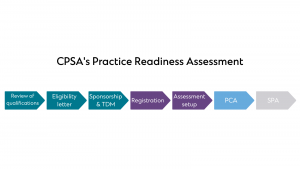Share
Medical Matters: CPSA’s Practice Readiness Assessment
Back to MessengerRead time: 2 minutes
By Dr. Michael Caffaro, Assistant Registrar, Registration
In 2021, international medical graduates made up nearly 35 per cent of Alberta’s physician workforce, helping provide safe and compassionate care to patients across the province. Before these physicians could practise in Alberta though, they each had to complete CPSA’s Practice Readiness Assessment (PRA)—the final step to independent practice in Alberta for those who do not have complete Canadian credentials. Under the Health Professions Act, CPSA has the authority to examine a physician’s clinical competence and professionalism to ensure Albertans receive the high-quality care they deserve. Like many aspects of health care, the PRA process involves collaboration between CPSA and our partners, including Alberta Health Services (AHS) and communities throughout the province. In this month’s Medical Matters, I’ll take you through CPSA’s PRA process, highlighting the objectives, how it works and the key milestones along the way.

The first step for internationally-trained physicians to practise in Alberta is submitting a summary of their qualifications through the Medical Council of Canada’s (MCC) Physicians Apply website. Physicians who meet the eligibility criteria for provisional registration must then apply for sponsorship from AHS, which helps make sure new-to-Alberta physicians can enter the workforce while also serving communities that have the highest need for physicians. Family physician candidates also complete the MCC’s Therapeutics and Decision Making (TDM) exam.
Once candidates have completed these steps, they must then submit specific documents so we may confirm qualifications and complete their CPSA registration. We can then begin the process of finding an assessor. This may take some time as we seek out assessors that are available, qualified and do not have conflicts of interest. Generally, the PRA process consists of two parts: a Preliminary Clinical Assessment (PCA) of three months, followed by a Supervised Practice Assessment (SPA) of three months.
During the PCA, candidates work under direct observation in the medical practice of a CPSA-approved assessor. Candidates are assessed in direct and indirect patient contact, interactions with healthcare colleagues, as well as their chart management and professionalism. To successfully complete the PCA, candidates must meet the same standards as Alberta physicians practising independently.
Next, during the SPA, a CPSA-approved supervisor will review candidates in independent practice—candidates are now the most responsible physicians and can bill Alberta Health for their medical services. Supervisors continue to communicate regularly with CPSA team members and, upon completion of the SPA, candidates continue practising in the community-based setting. Candidates remain on CPSA’s Provisional Register until they have either obtained their Canadian credentials or completed a follow-up assessment in their sixth year of practice. Candidates may then move to CPSA’s General Register.
Through collaboration and innovation, the PRA process continues to evolve to meet physician recruitment needs. Candidates can now take their TDM exams outside Canada, assessors and supervisors can submit their documentation online and AHS Zone leadership is helping identify potential assessors. On top of these improvements, CPSA has been working hard to increase efficiency throughout the process by recruiting new assessors, accepting candidates on a continuous basis and creating more targeted assessments. Plus, CPSA’s PRA was the only one of its kind in Canada to continue assessing candidates throughout the first year of the COVID-19 pandemic.
Physician recruitment is complex and constantly evolving, but it is also critically important to Alberta’s healthcare system—and to patients. Recruitment is a true team effort, from the first communication with new-to-Alberta physicians to the moment they complete the PRA process. CPSA is committed to doing our part as efficiently as possible to make sure Albertans get the care they need from qualified physicians—that is our mandate, after all.
 |
Dr. Michael Caffaro has been a CPSA team member since 2015 and is currently the Assistant Registrar, Registration at CPSA. Prior to this role, Dr. Caffaro worked in CPSA’s Professional Conduct department for six years as Complaints Director and Assistant Registrar, Professional Conduct. Dr. Caffaro is a University of Alberta graduate and, before joining CPSA, spent 22 years as a family physician in Hinton, Alta. |





















I have contacted CPSA several times to know if my training fulfils their requirements or not so that I can proceed with TDM. They just tell me to submit my application for assesment which is $250 and I know its waste of money because I don’t have english proficiency yet. It will be good if instead of publishing this they let us know our queries as I am just wanting to know about my training and I am not yet ready to submit application for assesment.
Hi there,
Thank you for taking the time to read The Messenger and provide feedback about your experience.
CPSA assesses qualifications through Physicians Apply (inclusive of training, practice experience and English language proficiency) to ensure consistency with other Canadian medical regulators and correctness when eligibility is determined. Providing verbal commentary on eligibility without submitted documentation of the reported training leaves an applicant at risk for a ‘refusal of registration’ later in the process – this would be reportable to all jurisdictions where an individual may subsequently apply. Following the ‘Physicians Apply’ process described above eliminates that risk and provides feedback as to shortcomings in an individual’s application.
Please note that the application criteria for a family medicine/general practice practitioner is found on our website: https://cpsa.ca/physicians/registration/apply-for-registration/apply-for-independent-practice/
Thanks again and take care.
Dr. Caffaro
Very good email. Very helpful..!
Thanks..!
Thank you for reading!
PRA is good way to assess and recruit IMGs
I have almost done 10 or more assessments in past successfully
Its very imperative for assessor to be non biased
To recognize IMGs strengths and weaknesses
And good positive feedbacks daily to help them reaching standards college required and make them assets for our province and conuntry.
Thank you for your feedback. I’m glad to hear you’ve had a positive experience with the program and as an assessor.
Dear Sir,
Clinical Assistants are working hard in all medical specialties. With the dearth of the well qualified medical professionals throughout the province. Why can’t clinical assistants given the same opportunity of practice ready assessment as other physicians who have no Canadian experience??. In fact CAs and SAs are already familiar with the Canadian health system and in good standing with the CPSA and AHS. Myself and some of my colleagues are pleased to meet with you if possible to discuss this matter.
Sincerely,
Good morning,
Thank you for taking the time to read The Messenger. We recognize that clinical assistants and all other healthcare professionals play an important role in the provision of safe, high-quality care for Albertans. To practice independently in Alberta, applicants must meet CPSA’s minimum eligibility requirements, some of which include a medical degree, completion of the MCCQE Part 1 exam and currency of practice.
You can find more information about CPSA’s eligibility requirements here: https://cpsa.ca/physicians/registration/apply-for-registration/apply-for-independent-practice/
Take care,
Dr. Caffaro
Need your guidance regarding PRA . Do you have email correspondence.
Thank you for reading The Messenger.
You’re welcome to contact a member of CPSA’s Registration team at publicinquiries@cpsa.ab.ca. You can also find more information about our Practice Readiness Assessment process here: https://cpsa.ca/physicians/registration/registration-assessments/
Hi Dr. Caffaro,
I wish to bring to your attention one of the eligibility criteria to sit in TDM exam. As you might know that prior to March, 2018, the 24 months of post-graduation training needn’t had to be in “2 continuous years”. Those IMGs who graduated a long time ago, the education system in parts of the world was such that the medical school lasted 5 years, followed by 12 months of postgraduate training in the form rotating internship. In order to meet the CPSA criteria of 24 months of postgraduate training, IMGs like myself went outside of Canada and completed an additional 12 months of training and met the CPSA criteria in terms of of rotations and in terms of duration, i.e. cumulative 24 months of training but unfortunately not in 2 continuous years. This happened not due to our fault but because the system of postgraduate education was such at the time of our graduation, something entirely beyond our control. The CPSA eligibility criteria to sit in TDM exam as of March, 2018 that the postgraduate training must be in “continuous 24 months” clearly places IMGs who have already been trying to get into the PRA program from before in a disadvantageous position. To reiterate, prior to March, 2018, duration of postgraduate training needed to be 24 months “in total” and the “continuity” clause was not there.
Alberta is our home and this is where we would like to live and serve healthcare needs of Albertans. I fully agree that postgraduate training should be in continuous 24 months but for the IMGs who have been trying to get into the PRA program from before March, 2018 and who have already once met CPSA eligibility criteria in place and effective at that time, I think this should be recognized and let us sit in the TDM. I am just asking to give us a chance to try and compete. It is a compelling case for IMGs who met the PRA criteria prior to March, 2018 but were unable to get into the program right away. Dr. Caffaro, it is not for the first time that I am addressing this concern. While I apologize for any inconvenience caused, it is my sincere hope that you will have time to revisit this matter and reconsider if at all possible. Thank you for your attention.
Thank you for taking the time to read The Messenger. A member of CPSA’s Registration team will follow up with you directly to discuss your concerns. Thanks again for reaching out.
Hi there,
According to the information above, eligibility requirements for PRA program is still the same, except that first three months of assessment have been waived.
I have passed all Canadian exams including NAC OSCE but I dont have that specific 24 months postgraduate training. I’m working as a general practitioner in Kuwait for 2 years.
Am I eligible for this program or I still need 24 months formal postgraduate training.
Regards
Thank you for reading The Messenger. An individual applicant’s eligibility is dependent on meeting the criteria in place at the time of application. Independent practice in family medicine requires a minimum of 24 months of continuous training in that specialty.
I’m IMG with 20 years experince in rura family & Emergency medicine includng last 10 years in canada in good standing , but yet CPSA not considering my experince and deeemd me not eligible for license in Alberta becasue college staff works with flow mpas and can not make exception or consideration. Even when i decided to go for PRA it seems not possible
it makes no sense for me
Thank you for reading The Messenger. A member of CPSA’s Registration team will be in touch with you directly to discuss your concerns. Thank you again for reaching out.